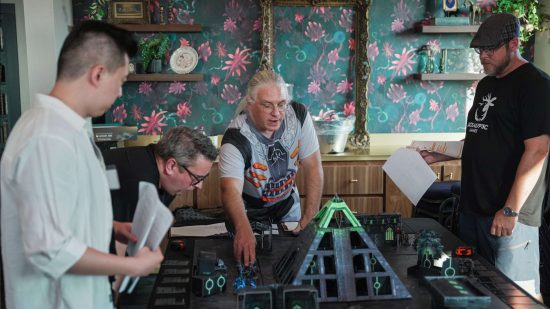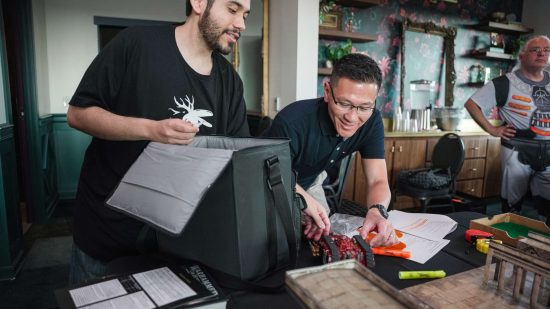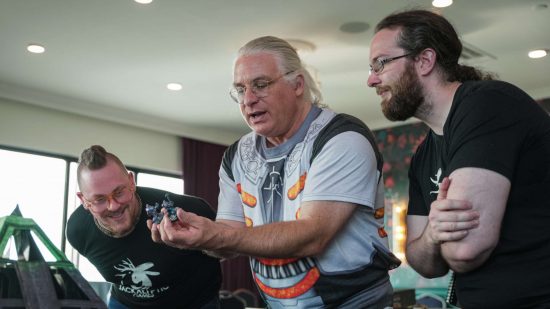Jack Emmert, the CEO and lead developer at Jackalyptic Games, is confident that publisher NetEase will provide “all the support” his team needs to bring its officially licensed Warhammer MMO to life. Emmert’s career spans three decades, and Wargamer had the chance to ask him all about it – and why he’s so confident in his new role.
If you haven’t read it already, check out the first part of our interview with Emmert, where he explains his 35 year love affair with the worlds of Warhammer, from his favorite Warhammer 40k factions, to what he thinks of 40k 10th edition.
How did you get started in the gaming industry?
When I was in graduate school working on my PhD for Greek and Latin, I used to write freelance for some tabletop RPG companies. Deadlands, Hell on Earth, Conspiracy X, I did some work for White Wolf.
How did you get into the video game industry?
Pure luck! I ran into somebody in ancient history class, Rick Dakan. He and I became fast friends, we co-wrote some of these RPG game supplements. A really good friend of his, Michael Lewis, had successfully sold a 3D chip company – and Rick had this great idea for a game.
Back then Ultima Online and Everquest were all the rage, and Rick was like “Well, let’s do Everquest for Superheroes”, and Michael was like “Great, here’s some seed money”. Rick invited me along because I knew a lot about comic books and we both worked together designing games. We’re like “How hard can it be?” Which was beyond stupid.

Michael introduced some people who were out in California were trying to start their own company, but who weren’t having any luck finding funding. So the five of us came together to form Cryptic Studios in July of 2000. Rick ended up leaving the company, as well as one other founder, and after about a year and a half, two years in, I lead the design for City of Heroes.
As our studio grew I got given bigger job titles, but I was always involved with the game design aspect – though less and less as time went on.
Your last job before founding Jackalyptic was running Daybreak Games – did that take you too far away from design?
Yeah, when I was at Daybreak I was overseeing DC Universe Online, as well as managing the Standing Stone Group, which did Lord of the Rings Online and Dungeons and Dragons online, and we had a game under development.

At that point Daybreak had been acquired by a public company and the demands of the job were going to require me to pretty much give up being involved in day to day game development and I just didn’t want to do it, it wasn’t my thing.
Right now I’m a game designer – I have the title CEO, but for example, we do regular play tests of what we’re working on internally, and I’m going through feedback right now. Then after that I’m writing a design overview for engineers to get to work on a system.
So at least with this game, most of the design is starting with me, and then I hand it off for others to execute or to add detail to.
Did anyone come with you from Daybreak to Jackalyptic?
A number of people I’ve worked with previously reached out to me after I left and helped form a nucleus. In Austen most game developers share someone they know in common, there’s this community of folks that know each other. There’s a familiarity, at least for half the team, whereas the other half are brand new folks.
How big is the Jackalyptic team now?
We’re at about 45.
And how big do you think you’ll need to get?
That’s the joy of working for a company like NetEase. I’m guessing 100, but I’m hoping to keep it less. And when I say ‘guess’, we want to get to a point where we can confidently say “This is how long it’s going to take, this is how much money it’s gonna take, this is how many people it’s going to take”, instead of being accountable to a schedule that we made when everything was theoretical.
NetEase is a remarkable company. Totally different than any experience I’ve ever had in the game industry.

So you have lots of space to plan?
Oh yeah! NetEase as an organisation is all about empowering creators to make the best game they can. They put their money where their mouth is. Their whole system is about getting a good game done, rather than a bad game within a hypothetical schedule or an arbitrary schedule, which has so often happened in the past to me.
I’ve been in situations where you make forecasts, you make budgets, and everything’s all neat and tidy, but the reality is game development comes with a lot of questions as you go. Nine times out of 10, unless a game is a sequel, it’s experimenting with technology, building on technology. You don’t know how long it’s going to take to do stuff, how long animations will take until you figure out the fidelity level that you want.
Right now, NetEase is absolutely amazing, giving us all the support that we need. That’s even more than monetary support. As an organisation NetEase is vast, twice as big as EA or more. There are experts in everything in NetEase. Every time I’ve asked for information or support there’s always somebody there for me. I can’t sing the praises of NetEase enough.
Come back tomorrow for part three of our interview, where Emmert explains the potential he sees for traditional MMOs in 2023. If you’re an MMO fan but you’ve never really gotten into Warhammer before, we have guides to the best digital Warhammer fantasy games and Warhammer 40k games, which are great ways to start exploring the settings.
Source: Wargamer







